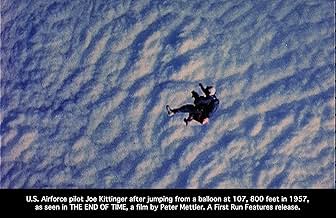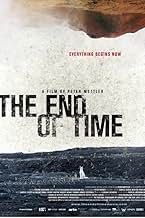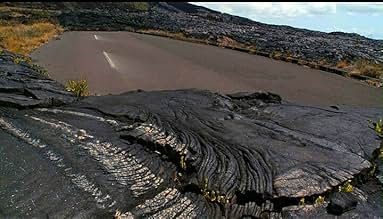Ajouter une intrigue dans votre langueExplores our perception of time.Explores our perception of time.Explores our perception of time.
- Director
- Writers
- Stars
- Prix
- 1 victoire et 9 nominations au total
Avis en vedette
The End of Time is a meditation on the nature of time in the loosest terms imaginable. Such a broad concept is laudable in its undertaking; however, the immensity and loftiness of this subject is what ultimately dooms the film. Ironically, the most common complaint I've seen about the movie is that it was a waste of time. And, at almost two hours, you would hope every minute of screen time is necessary to the story. At the outset of the film you quickly learn from very long, uninterrupted scenes and glacial narration that the filmmaker is using the movie to make the audience further aware of their perception of time. The pacing of the film is confrontationally slow to a audience that uses movies as a way to pass time or to escape into a world without the pressures of time for an hour and a half; though, I doubt the filmmaker intended to make a film that evokes confrontation rather than thoughtfulness. These long takes are an excellent concept and serve the filmmaker's intentions but only for the first ~30 minutes, until they lose the novelty and become cumbersome. One of the reasons this happens is because of the cinematography. There are some stunning shots and beautiful landscapes but there are also issues with consistency, framing, and camera quality that come off as amateurish. There's definitely more good than bad with the cinematography but for the scenes to earn their length, every shot should be great--not just good.
The other problem with the film is the concept itself. I expected a more narrowly defined thesis that explored the nature and origins of time and human understanding of it and I thought that was what I got when the movie started at CERN; however, the film took an abrupt philosophical turn that I did not expect. When the film begins to explore subjective and personal experiences of time, it also begins to feel like it takes itself too seriously and begins to rely too much on it's concept rather than the truth or incisiveness of it's subject matter.
I imagine it's a divisive film and the amount of people that hate it is equal to those that love it. The experience of the viewer is largely predicated on their foreknowledge of what kind of film it is and their reluctance or willingness to watch a long, discursive meditation on the nature of time.
The other problem with the film is the concept itself. I expected a more narrowly defined thesis that explored the nature and origins of time and human understanding of it and I thought that was what I got when the movie started at CERN; however, the film took an abrupt philosophical turn that I did not expect. When the film begins to explore subjective and personal experiences of time, it also begins to feel like it takes itself too seriously and begins to rely too much on it's concept rather than the truth or incisiveness of it's subject matter.
I imagine it's a divisive film and the amount of people that hate it is equal to those that love it. The experience of the viewer is largely predicated on their foreknowledge of what kind of film it is and their reluctance or willingness to watch a long, discursive meditation on the nature of time.
Funny how it's about time; all it did was waste mine. There is no plot or purpose: you are left wondering what in good heck you just watched. You know those people who throw a paint covered paint brush at a blank canvas and what ever random splatter it creates becomes a million dollar painting? Those people like this movie. Please, I urge you, do not waste your time. Not much to comment on since literally nothing happens.
A MEDITATION ON TIME Swiss-Canadian filmmaker Peter Mettler takes his sweet time making films. In the years since the transcendental epic Gambling, Gods and LSD (2002), Mettler again has traveled the world amassing mind-blowing images and sensations, and returns to Locarno with a meditation on a subject we experience daily but rarely take the time to ponder: time itself. His leapfrogging across space takes him from the now-famous particle accelerator in CERN to the ruins of Detroit to the lava flow of Big Island of Hawaii and to a Hindu death rite in India. Within each sub-adventure, experts and regular people provide their opinions on the meaning and uses of time, often in voice-over. Mettler proceeds instinctively; each unpredictable edit builds up an opus linked by the ephemeral presence of billowing clouds. And there is clearly a presence behind these images. Mettler's highly personal approach to a vast subject that is essentially unfilmable is not philosophical, rather perceptual (and ultimately environmental). Seemingly random - as random, say, as the weather - Mettler's trippy films work as perceptual experiences, and The End of Time makes viewers conscious of cinematic time, and of their own sense of time as they are watching the film. What does it mean to be a viewer, sitting in a theatre watching a film about a film about time? Like the scientists in CERN, Mettler is exploring for the sake of knowing -- free your mind, and the rest will follow. (Mark Peranson, Pardo Live Locarno)
Things this film is not: does not explore time, is not a documentary, is not artistic, is not experimental, is not animation, is not about death, is not sufficiently edited, is not thoughtfully soundtracked. In fact, most sentient folk have long known that "time" does not exist per se. This film makes as much sense as trying to render a pseudo-intellectual rendition of the concept of distance. blah.
For those of us old enough to remember the children's game Spirograph, and its younger equivalent Spirotot, much of this 2 hour film is just that. Another major "artistic" unoriginal is the abusive use of slow-motion, as if the simple act of slowing reality down a little made it somehow more "beautiful". Slow motion is fine to document and examine events that are too quick for the human eye, but that's pretty much the limit of its usefulness.
The trouble with this director, also evidenced in some previous films, is he thinks that he has a fantastic eye for beauty and uniqueness, when in reality, the cinematography is cold, uninspired, uninformative, and unoriginal. A reasonably tech savvy elementary school student could produce something of equal impact. He seems to want to be in the same league as Baraka and the Koyaanisqatsi series, but fails on all counts.
For those of us old enough to remember the children's game Spirograph, and its younger equivalent Spirotot, much of this 2 hour film is just that. Another major "artistic" unoriginal is the abusive use of slow-motion, as if the simple act of slowing reality down a little made it somehow more "beautiful". Slow motion is fine to document and examine events that are too quick for the human eye, but that's pretty much the limit of its usefulness.
The trouble with this director, also evidenced in some previous films, is he thinks that he has a fantastic eye for beauty and uniqueness, when in reality, the cinematography is cold, uninspired, uninformative, and unoriginal. A reasonably tech savvy elementary school student could produce something of equal impact. He seems to want to be in the same league as Baraka and the Koyaanisqatsi series, but fails on all counts.
Beautiful, mesmerizing meditation piece. Very gutsy to do as there is no story, not a series of interviews with experts: it's an experience and the theme of time is almost incidental.
The photography, music and image editing are all stunning. But none of them are "artsy" to call attention to themselves. They all contribute to this meditative experience. I love the fact that the venues range from LHC/CERN to Detroit to life at the edge of a volcano and it's ceaseless lava flow.
If you must have plot, tension and resolution to enjoy a movie, this is not for you. If you are ready to sit back and enjoy a beautiful experience, this will blow you away.
The photography, music and image editing are all stunning. But none of them are "artsy" to call attention to themselves. They all contribute to this meditative experience. I love the fact that the venues range from LHC/CERN to Detroit to life at the edge of a volcano and it's ceaseless lava flow.
If you must have plot, tension and resolution to enjoy a movie, this is not for you. If you are ready to sit back and enjoy a beautiful experience, this will blow you away.
Le saviez-vous
- Bandes originalesMind In Rewind (Live at DEMF 2010)
Written & produced by Richie Hawtin
Performed by Richie Hawtin (as Plastikman)
© 2003
Meilleurs choix
Connectez-vous pour évaluer et surveiller les recommandations personnalisées
Détails
- Date de sortie
- Pays d’origine
- Site officiel
- Langue
- Aussi connu sous le nom de
- The End of Time
- Lieux de tournage
- sociétés de production
- Consultez plus de crédits d'entreprise sur IMDbPro
Box-office
- Brut – États-Unis et Canada
- 4 375 $ US
- Fin de semaine d'ouverture – États-Unis et Canada
- 1 468 $ US
- 1 déc. 2013
- Brut – à l'échelle mondiale
- 4 375 $ US
- Durée1 heure 49 minutes
- Couleur
Contribuer à cette page
Suggérer une modification ou ajouter du contenu manquant

Lacune principale
By what name was La fin du temps (2012) officially released in Canada in English?
Répondre








